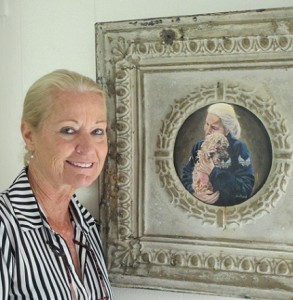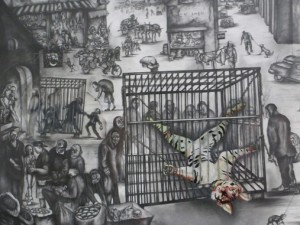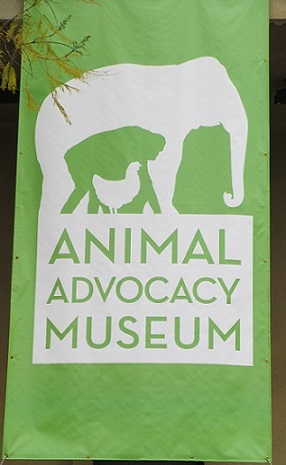This Pasadena Museum Shares, Enlightens, and Creates Community
When Patty Shenker learned there is a SPAM Museum, she decided that animals deserve a museum too. She teamed with friend and fellow activist Prabhat Gautam to find a spot to turn their vision for the Animal Advocacy Museum into reality. After over a year of searching, the founders discovered space in Pasadena, California in a building that is part of the veg-friendly Throop Unitarian Universalist Church.
The Animal Advocacy Museum‘s mission is to educate the public about the many important issues that surround the way animals are treated. Among other issues, the Museum shows the suffering in puppy mills, fur, animals used for “entertainment,” animal testing, and farming animals for food. So it’s exciting that the Museum includes not just room for exhibits, but also access to an events space.
The first exhibit launched March 30, 2013. In the short three months since then, the Museum has put up new exhibits and already sponsored powerful speakers and fund raisers for other animal advocacy groups, and is planning a variety of ways to get people together and inspire them, including social events and a best vegan pizza contest.
The first exhibit, Art Is Activism, was a big driver of the hard work to find and open the Museum. Cofounder Patty Shenker, an animal rights activist and vegan, had been collecting Sue Coe’s art for years and wanted to share the power of these moving images with art students and the public.
When I visited Patty in the Museum a few weeks after it opened, I was stunned by the power of Coe’s

Patty stands by a painting of herself holding a puppy mill dog just pulled from a horrific living situation
work. This English artist and author shows in mind-searing detail the suffering of animals at the hands of industries such as farming, fur, and wildlife capture.
A video Patty shared with me of a Sue Coe interview showed the artist willing to suffer “constant retraumatization” to reveal the concealed anguish that people are indifferent to. And Patty and Prabhat’s work to open the Museum creates a venue to share Sue Coe’s art and other tangible pictures and artifacts of animal suffering with people who can go out and advocate change. Seeing a bull hook, used to punish elephants in training for circuses and other “entertainment,” is a much different experience than reading about it or even seeing a photo. So the Museum touches visitors at a level that simply reading a book cannot.
I asked Patty about her journey to animal advocacy. The roots go back to childhood learnings. “My dad was a persecuted Russian Jew who fled the persecution. He became a criminal attorney defending the weak and spending a lot of his time on pro bono work. He told me “You have to help the underdog,” and I took in literally. My childhood pet dogs opened my heart. My pets showed me how powerful animals are, and how they feel intense joy and sadness and other emotions. When I got to college I wanted to live a nonviolent life. I realized there was violence on my plate and became a vegetarian. I rationalized eating dairy and eggs for many years, then

Patty’s soul-touching collection of Sue Coe art includes an unblinking depiction of this scene of pain. It’s even more compelling up close, because of all the details of more animal suffering in the background
finally could no longer deny the suffering in those foods and went vegan. I had no idea how this one lifestyle choice would change my life. I hurt every day because of human cruelty, but am extremely blessed to work for change and would not have it any other way.”
Currently the Animal Advocacy Museum is open 11-4 on Thursdays and Saturdays. Call ahead before your visit though, as the Museum is still young and there could be an unavoidable change in hours. Also keep an eye on the Museum’s events calendar for activities both fun and educational. Please help get the word out on this ground breaking endeavor. Patty and I are in agreement – the animals deserve a Museum. Let’s support this one.
If you enjoyed this post, you may want to read about other leaders, such as Dr. T. Colin Campbell, working for change by refusing to sugarcoat the truth.
Intrigued? Now you can use our Whole Foods Blog Finder to target informative, fun postings on whole foods, plant-based diets. Quick information at no cost!
Blog posting by Janice Stanger, Ph.D. Janice authored The Perfect Formula Diet: How to Lose Weight and Get Healthy Now With Six Kinds of Whole Foods. The book describes a plant-based eating plan that is good for both you and animals. Janice is glad that the Animal Advocacy Museum has opened, and hopes for similar museums around the world to educate and move people.
Tags: Animal Advocacy Museum, making a difference now, Patty Shenker, Prabhat Gautam, Sue Coe





